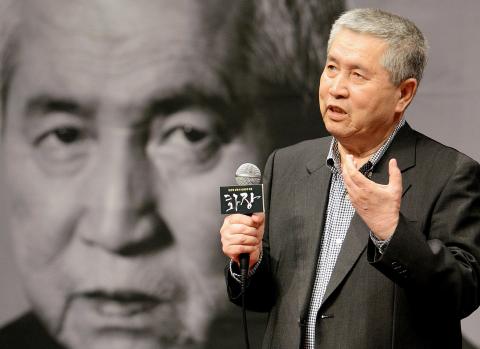Acclaimed Korean director Im Kwon-Taek has a simple explanation as to why he is embarking on his 102nd film at an age when others might consider taking things easy. “Film is my passion,” the 77-year-old said. “And you must follow your passion.”
Affectionately known as the “Grandfather of Korean cinema”, a large number of Im’s acclaimed productions have focused on what he sees as the erosion of Korean culture in a society that has seen rapid change in recent decades.
With giant posters of him displayed all over the city, Im has been an omnipresent force at this year’s 18th Busan International Film Festival (BIFF), which is screening 71 of his movies while making him the subject of a series of seminars and panel discussions. The first Korean to be named Best Director at the Cannes Film Festival for 2002’s Chihwaseon (Painted Fire) Im has marked the occasion by announcing his 102nd film in a career dating back to his 1962 debut Farewell to the Duman River.

Photo: AFP
“Films reflect the accumulated experiences of the life you have lived,” said Im. “The life I have lived is within me and I have to translate that into film.”
Shooting will start in December on an adaptation of Korean author Kim Hoon’s novel Hwajang.
The film, which reunites Im with acclaimed Korean actor Ahn Sung-Ki for their seventh production, focuses on an ageing man who lusts after a younger woman while caring for his dying wife. Hwajang means both “cremation” and “make-up”.
“I have always waited with baited breath for [Kim’s] next work,” Im said. “Hwajang is not a story that is very dramatic. But the tension and the beat of the work is what attracted me. It is a challenge but I am attracted to that challenge.”
The 61-year-old Ahn said he was also keen to explore the story’s deeper meanings.
“The director has always dealt with aspects of Korean culture to examine the human condition, and the upcoming film will probably focus more on the latter, like the book,” said Ahn. “It’s going to be a very difficult role to tackle as an actor.”
This year’s BIFF has also reunited the director with cast members from his romantic classic Seopyeonje (1993), which was the first film in Korea to sell more than one million admissions.
“No one thought people would come and see this film,” said Im. “There were many bigger productions coming about and it is a drama about Korean life. But word-of-mouth worked and the people just kept coming — it became a sensation.”
The director said he had wanted to use film to encourage people to not only reflect on their own lives but on the society that surrounds them.
“These things are important because they are part of who we are,” he said. “If I can help make people appreciate them more, then I think I have succeeded. I think we all need to take the time to reflect on our lives.”

On April 26, The Lancet published a letter from two doctors at Taichung-based China Medical University Hospital (CMUH) warning that “Taiwan’s Health Care System is on the Brink of Collapse.” The authors said that “Years of policy inaction and mismanagement of resources have led to the National Health Insurance system operating under unsustainable conditions.” The pushback was immediate. Errors in the paper were quickly identified and publicized, to discredit the authors (the hospital apologized). CNA reported that CMUH said the letter described Taiwan in 2021 as having 62 nurses per 10,000 people, when the correct number was 78 nurses per 10,000

As Donald Trump’s executive order in March led to the shuttering of Voice of America (VOA) — the global broadcaster whose roots date back to the fight against Nazi propaganda — he quickly attracted support from figures not used to aligning themselves with any US administration. Trump had ordered the US Agency for Global Media, the federal agency that funds VOA and other groups promoting independent journalism overseas, to be “eliminated to the maximum extent consistent with applicable law.” The decision suddenly halted programming in 49 languages to more than 425 million people. In Moscow, Margarita Simonyan, the hardline editor-in-chief of the

Six weeks before I embarked on a research mission in Kyoto, I was sitting alone at a bar counter in Melbourne. Next to me, a woman was bragging loudly to a friend: She, too, was heading to Kyoto, I quickly discerned. Except her trip was in four months. And she’d just pulled an all-nighter booking restaurant reservations. As I snooped on the conversation, I broke out in a sweat, panicking because I’d yet to secure a single table. Then I remembered: Eating well in Japan is absolutely not something to lose sleep over. It’s true that the best-known institutions book up faster

Though the total area of Penghu isn’t that large, exploring all of it — including its numerous outlying islands — could easily take a couple of weeks. The most remote township accessible by road from Magong City (馬公市) is Siyu (西嶼鄉), and this place alone deserves at least two days to fully appreciate. Whether it’s beaches, architecture, museums, snacks, sunrises or sunsets that attract you, Siyu has something for everyone. Though only 5km from Magong by sea, no ferry service currently exists and it must be reached by a long circuitous route around the main island of Penghu, with the